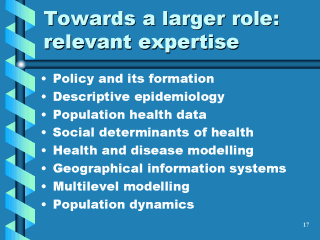 |
How epidemiology can play a bigger role in policy-making.
I am calling here for evidence-based policy, specifically policy based on epidemiologic
evidence. As a discipline, we must broaden our expertise, to include a greater
knowledge of policy and its formation on the one hand, and of appropriate epidemiologic
methods on the other. The latter include a rehabilitation of descriptive epidemiology,
better use of population health data (including administrative data), emphasis on the
social determinants of health (since these are what government policies can directly
influence), and health and disease modelling. We need to import several techniques from
the social sciences, including geographical information systems and multilevel modelling.
Demography is particularly important: since policy is implemented in real populations, the
underlying population in the denominator is as important to population health as the
epidemiologic events in the numerator. Borrowing from economics is already well underway,
by way of economic analyses and methods for determining the utilities of various health
states (needed for QALYs, etc.). |
